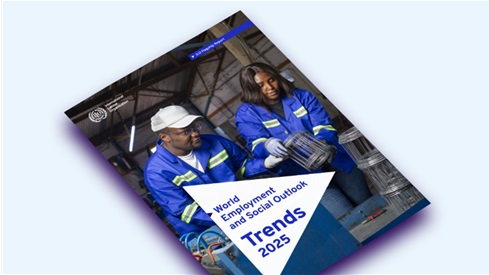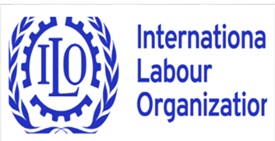Why in News?
The International Labour Organisation (ILO) has released the Global Employment and Social Outlook Report, 2025.

Key findings of the report:
Decline in labour force participation:
- Labour force participation has declined in low-income countries. In contrast, it is continuously increasing in high-income countries.
- Labour force participation rate has increased significantly in South Asia.
- This is mainly due to the increase in female participation in India.
Global economic growth
- Global economic growth is projected to be 3.2% in 2024, which is lower than 3.3 and 3.6% in 2023 and 2022 respectively.
- India's growth rate is the fastest in the world, which underlines the better performance of GDP in South Asia.
- The growth rate for India is estimated to be 6.4% in 2025.
Recovery Challenges:
- Geopolitical tensions, rising costs of climate change and unresolved debt pose challenges to recovery and put pressure on labour markets.
Global Jobs Gap:
- The number of people who want to work but do not have a job is estimated to reach 402 million in 2024.
- This includes unemployed, temporarily unavailable and discouraged workers who have stopped looking for a job.
Unemployment Rate:
- Global unemployment remains stable at 5% in 2024, with youth unemployment at 12.6%.
Jobs in Green and Digital Sectors:
- Job growth potential has been identified in green energy and digital technologies.
- Renewable energy jobs worldwide have increased to 16.2 million, driven by investments in solar and hydrogen power.
- Many low-income countries lack the infrastructure and critical skills to fully benefit from digital technologies.
Key recommendations:
- Decent work and productive employment required to achieve social justice and sustainable development goals
- Increasing productivity by investing in skills training
- Expanding social security
- Encouraging effective use of private funds for local development in low-income countries
- Providing better access to safe working conditions to reduce inequality
International Labour Organisation (ILO):

- Introduction: Specialized agency of the United Nations
- Formed: 11 April 1919
- Headquarters: Geneva, Switzerland
- Membership: 187
- Nobel Peace Prize: 1969
- Objective: To advance social and economic justice by setting international labour standards
- Mission:
- To set and promote standards and fundamental principles and rights at the workplace
- To create maximum and decent employment and income opportunities for women and men
- Coverage of social security for all and enhancing effectiveness
- Strengthening tripartism (governments, employers and workers) and social dialogue



